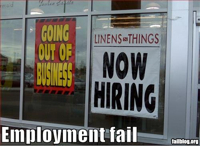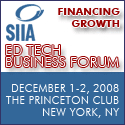 What are the prospects for raising capital for education technology companies in the current financial meltdown? Last week at the SIIA Ed-Tech Business Forum a panel of investors tackled this question. The panelists presented some solid and detailed advice for investors and companies seeking capital during the recession.
What are the prospects for raising capital for education technology companies in the current financial meltdown? Last week at the SIIA Ed-Tech Business Forum a panel of investors tackled this question. The panelists presented some solid and detailed advice for investors and companies seeking capital during the recession.
Key Points:
- Many investors are seeing Education as a safe harbor in a turbulent market, it is seen as relatively recession resistant. Education’s profile is rising as a marquee investment arena for the next 10 years – it is a good time right now for education.
- Take in as little as possible at as light a valuation you can get because valuations are going to be low for a while.
- The strong are going to win big in this downturn. Access to capital is going to be an important differentiator in this market.
- Most venture firms are not looking at new deals, they are focused on down rounds and propping up existing investments. They are also all moving up the deal chain to safer investments than they make in normal times. If you are raising money be aware of this.
- It is all about being profitable per customer in this market. Hope isn’t a strategy – go get paying customers and drive a lifetime revenue model
- Focus down on the core of what you have to provide and strip the organization down to doing just that. Have a crystal clear picture of who your customers will be, how they will find the money, and what are the essential features.
The panelists were:
Chris began with an overview of the market trends. Many investors are seeing Education as a safe harbor in a turbulent market, it is seen as relatively recession resistant. He noted that there is a huge capital overhang – investors have lots of funds but are making few investments. In education fundraising is actually up this year but we are seeing deals that are over capitalized. Later on Frank made the case that this is a bad deal from the entrepreneur’s side.
Most investment groups are setting the bar higher for new deals. Investors are looking for $10m Revenue and $2m EBIDTA which leaves out most K-12 Ed-Tech companies. Companies at this size need capital to invest in Sales and Marketing to scale up. Lots of education companies with good products in the last 10 years have failed because they couldn’t get past this hurdle.
His slides include a list of the private equity investors in education and a list of 100 deals that have been done in the education space in the past two years.
Follow below the fold for details on each panelists comments and the audience Q&A.
Continue reading
 The tribe gathered, bad coffee was drunk, stale muffins were eaten, and we shared insights and guesses about where education technology and publishing are headed in era of tight budgets and ARRA munificence. It was a typical first week of December in New York.
The tribe gathered, bad coffee was drunk, stale muffins were eaten, and we shared insights and guesses about where education technology and publishing are headed in era of tight budgets and ARRA munificence. It was a typical first week of December in New York. The Education Business Blog
The Education Business Blog


 This article is based on notes from a panel at the
This article is based on notes from a panel at the  What are the prospects for raising capital for education technology companies in the current financial meltdown? Last week at the
What are the prospects for raising capital for education technology companies in the current financial meltdown? Last week at the  This panel is made up of seasoned veterans of the M&A markets for Education Technology companies. They addressed the K12, Higher Education / Post-secondary, and general M&A climate.
This panel is made up of seasoned veterans of the M&A markets for Education Technology companies. They addressed the K12, Higher Education / Post-secondary, and general M&A climate. I will be blogging today from the Software Information Industry Association’s Ed Tech Forum 2008. The event is taking place at a monument to mid-20th Century American hegemony – the Princeton Club in New York.
I will be blogging today from the Software Information Industry Association’s Ed Tech Forum 2008. The event is taking place at a monument to mid-20th Century American hegemony – the Princeton Club in New York.